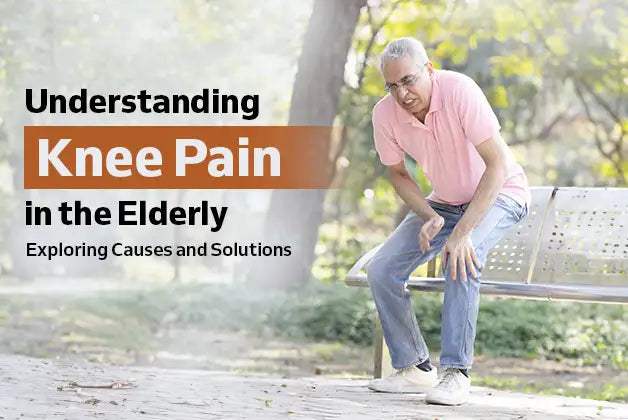
Understanding Knee Pain in the Elderly: Exploring Causes and Solutions
Share
Aging often brings wisdom and experience, but it can also bring unwelcome guests like painful knees and sore joints. For the elderly, knee problems can become a significant issue, affecting mobility and overall quality of life. Understanding the common causes of knee problems in seniors is crucial for effective joint care and maintaining an active lifestyle. This blog delves into the various causes of knee problems among the elderly and explores ways to manage and treat these issues through natural remedies, lifestyle changes, and medical interventions.
Common Causes of Knee Problems in the Elderly

As we age, our knees can become more susceptible to pain and discomfort. This blog delves into the various causes of knee problems among the elderly and explores effective solutions through natural remedies, lifestyle adjustments, and medical interventions.
1. Osteoarthritis and Degenerative Osteoarthritis
Osteoarthritis is the leading cause of knee pain among older adults, characterized by the breakdown of cartilage that cushions the joints. This degeneration results in stiffness and discomfort, exacerbated by factors like age, obesity, and previous joint injuries.
Management and Treatment:
- Weight Management: Maintaining a healthy weight reduces stress on the knees, slowing the progression of osteoarthritis.
- Exercise: Engaging in low-impact activities such as swimming, cycling, and walking strengthens knee-supporting muscles.
- Ayurvedic Treatment: Herbs like boswellia, ashwagandha, and turmeric offer natural anti-inflammatory benefits.
- Pain Relief: Natural and Ayurveda-based pain relief solutions like Orth Eaze Capsules provide effective pain management.
- Topical Treatments: Ortho oils like Dhanwantaram Taila and other topical solutions offer localized relief from discomfort.
2. Knee Injuries

Common in the elderly due to falls or sudden movements, knee injuries such as meniscal tears, ligament tears (e.g., ACL tears), and fractures can cause acute pain and lead to long-term complications if not properly managed.
Management and Treatment:

- Immediate Care: Initial management includes rest, ice, compression, and elevation (RICE) to reduce swelling and pain.
- Physical Therapy: Structured rehabilitation programs restore knee function and strengthen supporting muscles.
- Medication: Severe pain may require prescription medications tailored for joint pain relief.
- Supportive Devices: Using knee caps or braces provides additional support during recovery phases.
3. Arthritis and Inflammatory Conditions
In addition to osteoarthritis, conditions like rheumatoid arthritis and gout can cause inflammation in the knee joints, leading to significant discomfort and reduced mobility.
Management and Treatment:
- Anti-inflammatory Medications: Corticosteroids and disease-modifying antirheumatic drugs (DMARDs) effectively manage inflammation.
- Ayurvedic Remedies: Utilizing herbs such as guggul in combination with dietary adjustments helps reduce inflammation naturally.
- Dietary Adjustments: Incorporating omega-3 fatty acids, antioxidants, and fiber-rich foods supports overall joint health and manages symptoms effectively.
4. Bursitis and Tendinitis
Overuse or repetitive movements can lead to bursitis (inflammation of bursae) and tendinitis (inflammation of tendons) around the knee, contributing to pain and stiffness.
Management and Treatment:
- Rest and Modification: Avoiding activities that aggravate symptoms is essential for recovery.
- Physical Therapy: Targeted exercises help alleviate pain and strengthen the affected tissues.
- Medications: Anti-inflammatory drugs and pain relievers provide relief from symptoms.
- Herbal Remedies: Natural anti-inflammatory agents like boswellia and turmeric can complement conventional treatments effectively.
5. Hip Joint Pain and Ankle Pain
Issues in the hips and ankles can affect knee joints due to the interconnected musculoskeletal system, altering gait and increasing stress on the knees.
Management and Treatment:

- Footwear: Wearing supportive shoes with adequate cushioning reduces stress on the knees during daily activities.
- Exercise: Strengthening hip and ankle muscles through targeted exercises improves overall alignment and reduces knee pain.
- Ayurvedic Approaches: Incorporating holistic methods like osteoarthritis ayurvedic medicine supports joint health and mobility.
6. Patellofemoral Pain Syndrome (Runner's Knee)
Patellofemoral pain syndrome, often termed as runner's knee, involves pain around the patella (kneecap) due to overuse, muscle imbalances, or improper tracking of the patella within the femoral groove.
Management and Treatment:
- Activity Modification: Avoiding activities that aggravate symptoms, such as running on hard surfaces.
- Physical Therapy: Strengthening exercises for the quadriceps and hip muscles to improve patellar alignment.
- Orthotics: Using shoe inserts or braces to support proper knee alignment during activities.
- Pain Relief: Ayurvedic Medicines or topical treatments to reduce pain and inflammation.
7. Patellar Tendinitis (Jumper's Knee)
Patellar tendinitis, also known as jumper's knee, is an overuse injury that affects the tendon connecting the kneecap (patella) to the shinbone. It commonly occurs in individuals who participate in activities that involve repetitive jumping or running.
Management and Treatment:
- Rest and Activity Modification: Avoid activities that strain the knee tendon.
- Physical Therapy: Strengthening and stretching exercises to improve tendon flexibility and strength.
- Medications: Nonsteroidal anti-inflammatory drugs (NSAIDs) for pain relief and inflammation management.
- Supportive Measures: Using knee braces or straps to alleviate pressure on the tendon during activities.
A Holistic Approach to Knee Health
Knee problems in the elderly can be managed and even prevented with a comprehensive approach that includes lifestyle changes, natural remedies, and appropriate medical interventions. By addressing the underlying causes and utilizing treatments like Ayurvedic arthritis remedies, physical therapy, and joint pain medicine, seniors can maintain their mobility and quality of life. Emphasizing joint care through regular exercise, weight management, and the use of supportive devices can also play a significant role in preventing and managing knee joint pain. Ultimately, understanding and addressing the various factors contributing to knee problems can empower seniors to lead active, pain-free lives.
By incorporating these strategies and seeking the right medical advice, elderly individuals can effectively manage their knee joint pain and enjoy a higher quality of life. The journey to healthier knees involves a blend of modern medicine and time-tested natural remedies, ensuring a balanced approach to joint pain care.